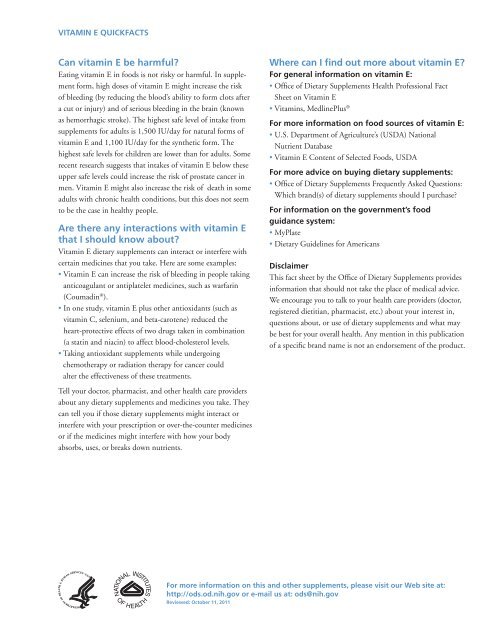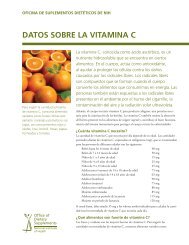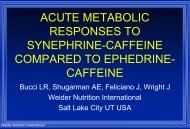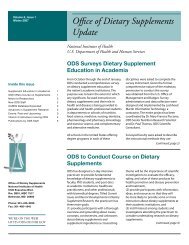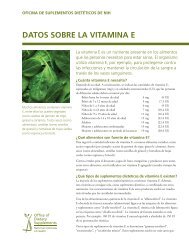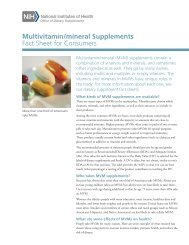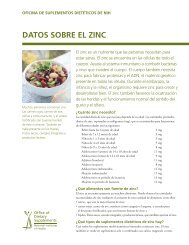Vitamin E - Office of Dietary Supplements
Vitamin E - Office of Dietary Supplements
Vitamin E - Office of Dietary Supplements
You also want an ePaper? Increase the reach of your titles
YUMPU automatically turns print PDFs into web optimized ePapers that Google loves.
VITAMIN E QUICKFACTS<br />
Can vitamin E be harmful<br />
Eating vitamin E in foods is not risky or harmful. In supplement<br />
form, high doses <strong>of</strong> vitamin E might increase the risk<br />
<strong>of</strong> bleeding (by reducing the blood’s ability to form clots after<br />
a cut or injury) and <strong>of</strong> serious bleeding in the brain (known<br />
as hemorrhagic stroke). The highest safe level <strong>of</strong> intake from<br />
supplements for adults is 1,500 IU/day for natural forms <strong>of</strong><br />
vitamin E and 1,100 IU/day for the synthetic form. The<br />
highest safe levels for children are lower than for adults. Some<br />
recent research suggests that intakes <strong>of</strong> vitamin E below these<br />
upper safe levels could increase the risk <strong>of</strong> prostate cancer in<br />
men. <strong>Vitamin</strong> E might also increase the risk <strong>of</strong> death in some<br />
adults with chronic health conditions, but this does not seem<br />
to be the case in healthy people.<br />
Are there any interactions with vitamin E<br />
that I should know about<br />
<strong>Vitamin</strong> E dietary supplements can interact or interfere with<br />
certain medicines that you take. Here are some examples:<br />
• <strong>Vitamin</strong> E can increase the risk <strong>of</strong> bleeding in people taking<br />
anticoagulant or antiplatelet medicines, such as warfarin<br />
(Coumadin ® ).<br />
• In one study, vitamin E plus other antioxidants (such as<br />
vitamin C, selenium, and beta-carotene) reduced the<br />
heart-protective effects <strong>of</strong> two drugs taken in combination<br />
(a statin and niacin) to affect blood-cholesterol levels.<br />
• Taking antioxidant supplements while undergoing<br />
chemotherapy or radiation therapy for cancer could<br />
alter the effectiveness <strong>of</strong> these treatments.<br />
Tell your doctor, pharmacist, and other health care providers<br />
about any dietary supplements and medicines you take. They<br />
can tell you if those dietary supplements might interact or<br />
interfere with your prescription or over-the-counter medicines<br />
or if the medicines might interfere with how your body<br />
absorbs, uses, or breaks down nutrients.<br />
Where can I find out more about vitamin E<br />
For general information on vitamin E:<br />
• <strong>Office</strong> <strong>of</strong> <strong>Dietary</strong> <strong>Supplements</strong> Health Pr<strong>of</strong>essional Fact<br />
Sheet on <strong>Vitamin</strong> E<br />
• <strong>Vitamin</strong>s, MedlinePlus ®<br />
For more information on food sources <strong>of</strong> vitamin E:<br />
• U.S. Department <strong>of</strong> Agriculture’s (USDA) National<br />
Nutrient Database<br />
• <strong>Vitamin</strong> E Content <strong>of</strong> Selected Foods, USDA<br />
For more advice on buying dietary supplements:<br />
• <strong>Office</strong> <strong>of</strong> <strong>Dietary</strong> <strong>Supplements</strong> Frequently Asked Questions:<br />
Which brand(s) <strong>of</strong> dietary supplements should I purchase<br />
For information on the government’s food<br />
guidance system:<br />
• MyPlate<br />
• <strong>Dietary</strong> Guidelines for Americans<br />
Disclaimer<br />
This fact sheet by the <strong>Office</strong> <strong>of</strong> <strong>Dietary</strong> <strong>Supplements</strong> provides<br />
information that should not take the place <strong>of</strong> medical advice.<br />
We encourage you to talk to your health care providers (doctor,<br />
registered dietitian, pharmacist, etc.) about your interest in,<br />
questions about, or use <strong>of</strong> dietary supplements and what may<br />
be best for your overall health. Any mention in this publication<br />
<strong>of</strong> a specific brand name is not an endorsement <strong>of</strong> the product.<br />
For more information on this and other supplements, please visit our Web site at:<br />
http://ods.od.nih.gov or e-mail us at: ods@nih.gov<br />
Reviewed: October 11, 2011


